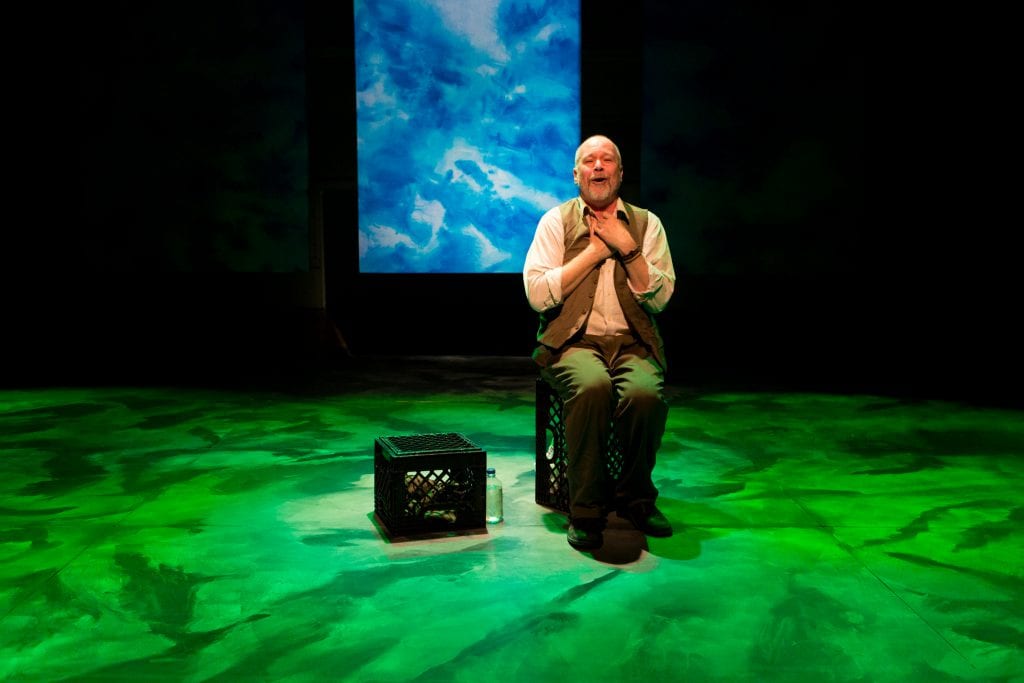The “Everyman” at the center of RJ Bartholomew’s poetic monologue, or “solo riff,” I of the Storm, now playing at the Gym at Judson and featuring an indefatigable performance by Richard Hoehler, is a homeless street poet who has known a life far different than the one that currently has him living in a city park and eating discarded paninis. Once upon a time he was a successful businessman, until white-collar crime landed him in jail, rendered him unemployable, and cost him his family, friends, and possessions. Having honed his writing skills in prison, he’s become a soothsayer, ignored by many, branded as a lunatic by some, but determined to spout wisdom and truth in the face of complacency and greed and a society careening toward self-destruction.
All of this feels well-intentioned, timely, and occasionally shrewd and lyrical. But, ultimately, the story never transcends the clichés and generalizations that make it seem more like a New Age self-help speech than a complex examination of a character’s inner life. Be yourself, love is all you need, carpe diem, we are told—noble sentiments to be sure, but rendered trite and even meaningless if not anchored in anything specific or dramatic, and instead offered to the audience as nuggets of advice.
Dressed in a shabby, stained suit, Hoehler’s appearance recallsChaplin’s Tramp, an association made stronger as he expertlyincorporates dance, movement, and clownish elements into his performance. (I initially also thought of Beckett’s tramps Vladimir and Estragon, but in its certainty, preachiness, and easily digestible philosophy, this is a world far removed from Beckett’s.) Under Janice Goldberg’s unobtrusive directing and Mark Symczak’s minimalist design—aside from two crates and a notebook the stage is bare, backed by three panel paintings that depict the sky—Hoehler alternates between a conversational tone, as he establishes the contours of his story or lays out the meaning of life, and episodes of rhymed philosophizing, accentuated by Michael Abrams’s lighting. We learn that these verse soliloquies are the poems that he recites to passersby, hoping for a spare buck and, more importantly, some kind of human connection.
He receives this connection in the person of Mars, an eccentric would-be artist in her early 30s, whom Hoehler voices as he recounts conversations and adventures the two had together. The strength of this section of the monologue is that it groundsBartholomew’s observations in something concrete—an unlikely, ersatz father-daughter relationship. But it is also burdened by a clumsy sentimentality and is unable to escape cliché, as when, for example, we are told that Mars “died of a broken heart.”
Toward the end of the production, Hoehler unleashes a long, impassioned, verbally intricate sermon on the myriad ills that plague contemporary society—the conceit has him flipping through television channels and riffing on the images to offerglimpses of American life. As with the script’s themes, Hoehler’s acting style is broad—there is no room for subtlety here. Yet it is in this frenetic, stylized diatribe that the production achieves its greatest force, propelled by Hoehler’s energy, well-timed movement, and ability to clearly articulate the torrent of words. What we are left with, however, when Hoehler’s tramp has left the stage, is really just a collection of slogans that, however well presented, never take us beneath the surface.

Michael Abrams
3
Reviewer's Rating
